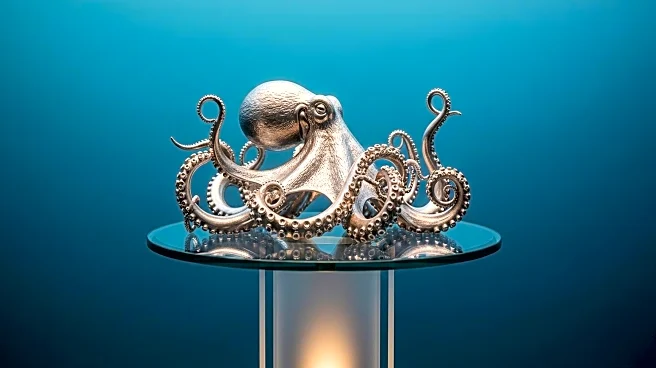What's Happening?
Recent research conducted by the Marine Biological Laboratory in Woods Hole, Massachusetts, has unveiled the remarkable multitasking abilities of octopuses. The study, published in the journal Scientific Reports, analyzed underwater videos of octopuses filmed in various locations, including Spain, South Florida, and the Cayman Islands, from 2007 to 2015. Researchers meticulously examined the footage to document specific arm movements such as tucking, lowering, or rolling, as the octopuses engaged in activities like standing or moving rocks. The findings highlight the octopus's ability to use any of its eight limbs to perform tasks simultaneously, showcasing their neurological complexity and adaptability.
Why It's Important?
The study's findings have significant implications for understanding the evolution of complex motor skills in animals. Octopuses, known for their flexibility and intelligence, provide insights into how such sophisticated coordination is achieved. This research could influence the development of soft robotics, particularly in medical applications or exploring inaccessible areas. By mimicking the octopus's arm movements, engineers can design robots capable of intricate tasks, potentially revolutionizing fields that require delicate and precise operations. The study underscores the octopus's role as a model for innovation in robotics and neurological research.
What's Next?
The research opens avenues for further exploration into the neurological mechanisms behind the octopus's multitasking abilities. Scientists may delve deeper into the evolutionary aspects that have enabled these creatures to develop such advanced motor skills. Additionally, the study could inspire new designs in robotics, prompting engineers to create more sophisticated soft robots that emulate octopus movements. As the understanding of octopus biology expands, it may lead to breakthroughs in both biological research and technological applications, fostering advancements in various scientific and engineering domains.
Beyond the Headlines
The study also raises ethical considerations regarding the use of animals as models for technological development. As octopuses continue to inspire innovations in robotics, discussions around the ethical treatment and conservation of these intelligent creatures may gain prominence. Furthermore, the research highlights the importance of preserving marine ecosystems, as the natural habitats of octopuses play a crucial role in their behavioral studies. The findings may encourage efforts to protect these environments, ensuring the continued study and appreciation of octopuses and their unique capabilities.










